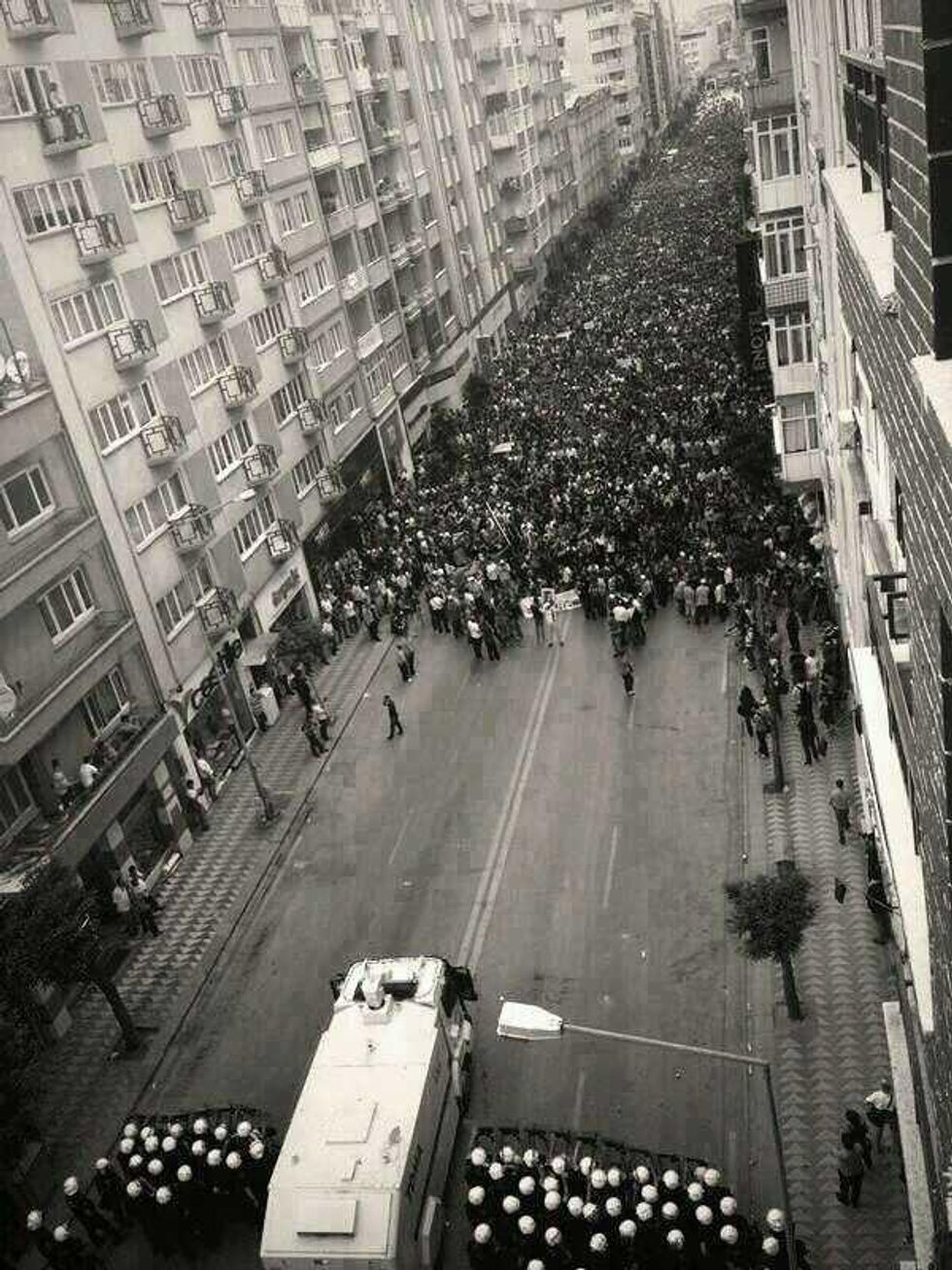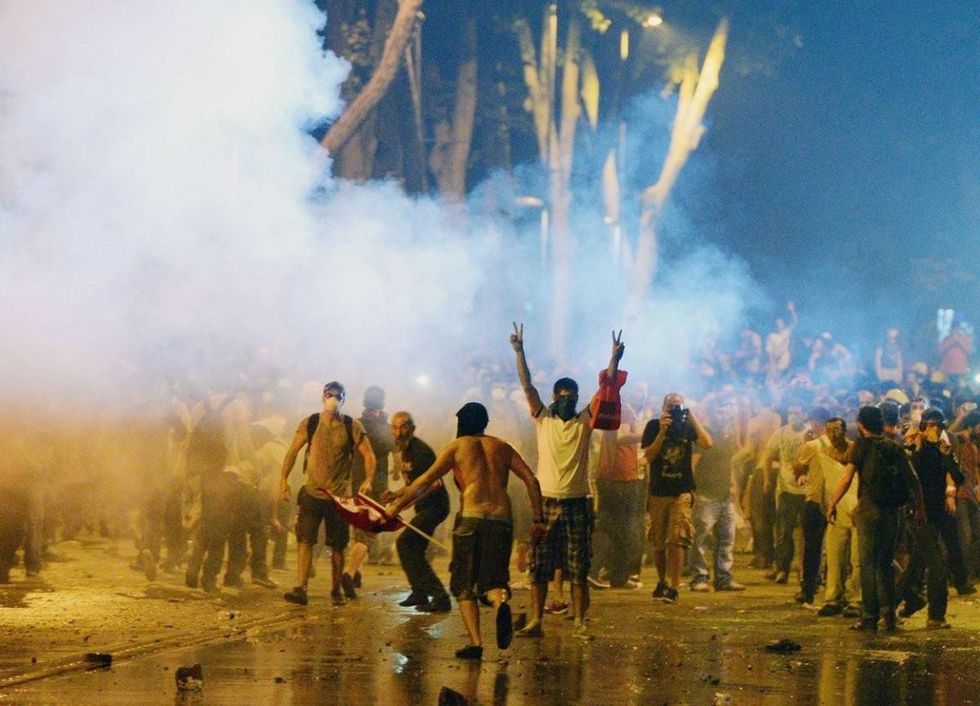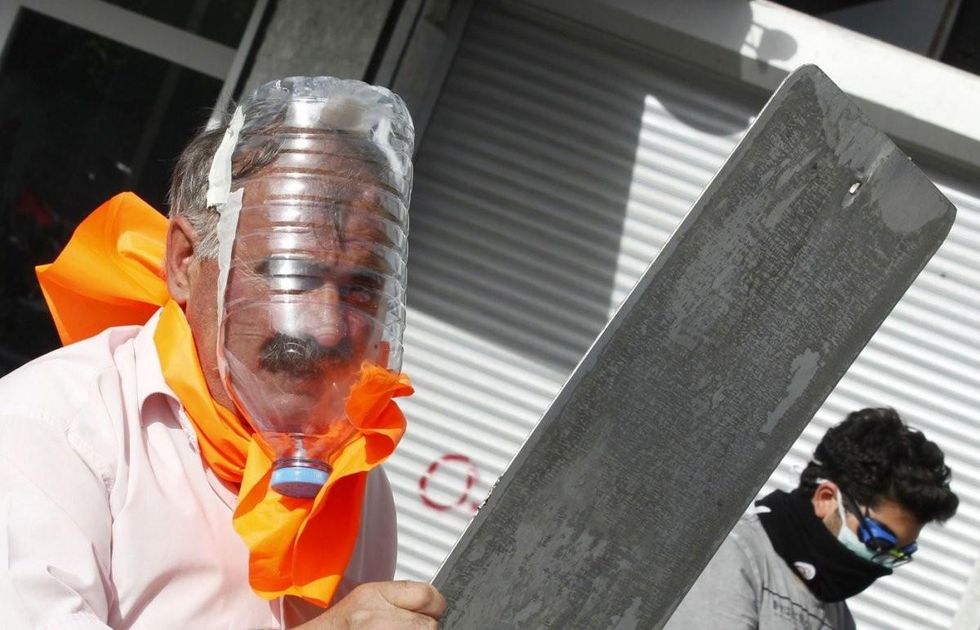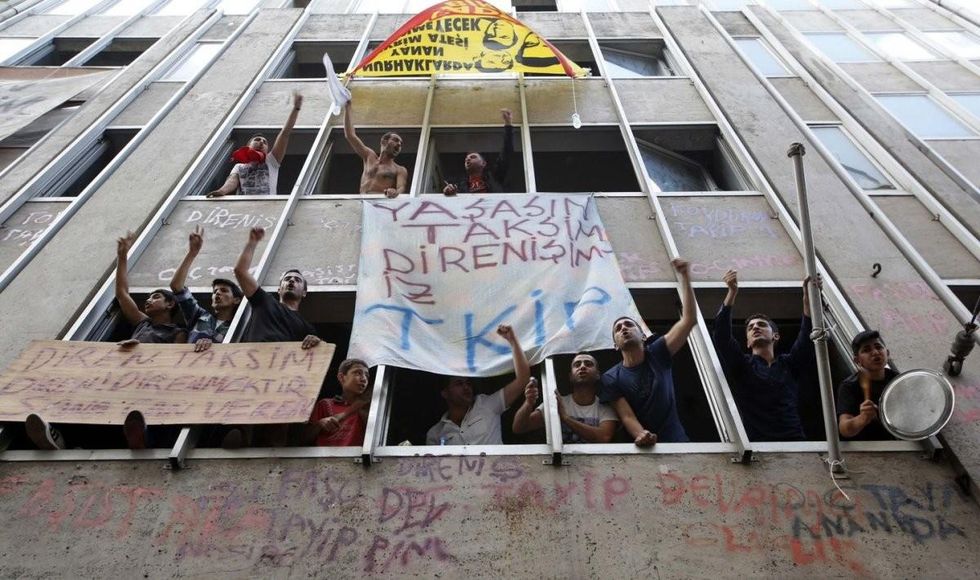

SUBSCRIBE TO OUR FREE NEWSLETTER
Daily news & progressive opinion—funded by the people, not the corporations—delivered straight to your inbox.
5
#000000
#FFFFFF
To donate by check, phone, or other method, see our More Ways to Give page.


Daily news & progressive opinion—funded by the people, not the corporations—delivered straight to your inbox.

Meanwhile, what started in Istanbul has spread to Turkey's capital Ankara where youthful opposition forces condemned the prime minister, marched by the thousands on his government offices, and continued to call for his resignation.
Explaining the explosion of activism and protest, as one popular tweet phrased it, the growing popular movement in Turkey is "resisting for its future":
And the #occupygezi hashtag was trending all over the world throughout the weekend:
Tweets about "#occupygezi OR #OccupyTaksim lang:en"
The Guardian reports from Istanbul:
What started last Monday as a relatively small, peaceful protest to save an inner city park from having to make way for a kitschy Ottoman-style shopping centre, rapidly snowballed into the largest and most violent anti-government protests that Turkey has seen in years.
Hundreds were injured, some seriously, by the heavy-handed police response and excessive use of teargas. Riot police withdrew from the capital on Saturday evening, handing a victory to the demonstrators.
The protests spread across Turkey to half of its 81 provinces, the interior ministry said. It added that 939 people had been arrested in 90 demonstrations all over the country, while damage costs have not yet been announced.
On Sunday, Al Jazeera's Gonca Senay reported from capital city of Ankara, where protests had also erupted over the weekend and police have fired tear gas and water cannons to keep protesters away from the office of Prime Minister Recep Tayyip Erdogan:
And CCTV America reports:
Reporting from Al-Jazeera added:
The Turkish Doctors Association said the three days of demonstrations have left 1,000 people injured in Istanbul and 700 in Ankara.
Interior Minister Muammer Guler said more than 1,700 people had been detained in protests that have spread to 67 cities, though most have since been released.
"A large majority of the detainees were released after being questioned and identified," he said in remarks carried by the state-run Anatolia news agency.
Protesters also clashed with police in Izmir and Adana, Turkey's third and fourth biggest cities, on Sunday.
The ferocity of the police response in Istanbul on Saturday shocked Turks, as well as tourists caught up in the unrest in one of the world's most visited destinations.
It has drawn rebukes from the US, European Union and international rights groups.
Helicopters fired tear gas canisters into residential neighbourhoods and police used tear gas to try to smoke people out of buildings. Footage on YouTube showed one protester being hit by an armoured police truck as it charged a barricade.



Dear Common Dreams reader, The U.S. is on a fast track to authoritarianism like nothing I've ever seen. Meanwhile, corporate news outlets are utterly capitulating to Trump, twisting their coverage to avoid drawing his ire while lining up to stuff cash in his pockets. That's why I believe that Common Dreams is doing the best and most consequential reporting that we've ever done. Our small but mighty team is a progressive reporting powerhouse, covering the news every day that the corporate media never will. Our mission has always been simple: To inform. To inspire. And to ignite change for the common good. Now here's the key piece that I want all our readers to understand: None of this would be possible without your financial support. That's not just some fundraising cliche. It's the absolute and literal truth. We don't accept corporate advertising and never will. We don't have a paywall because we don't think people should be blocked from critical news based on their ability to pay. Everything we do is funded by the donations of readers like you. Will you donate now to help power the nonprofit, independent reporting of Common Dreams? Thank you for being a vital member of our community. Together, we can keep independent journalism alive when it’s needed most. - Craig Brown, Co-founder |

Meanwhile, what started in Istanbul has spread to Turkey's capital Ankara where youthful opposition forces condemned the prime minister, marched by the thousands on his government offices, and continued to call for his resignation.
Explaining the explosion of activism and protest, as one popular tweet phrased it, the growing popular movement in Turkey is "resisting for its future":
And the #occupygezi hashtag was trending all over the world throughout the weekend:
Tweets about "#occupygezi OR #OccupyTaksim lang:en"
The Guardian reports from Istanbul:
What started last Monday as a relatively small, peaceful protest to save an inner city park from having to make way for a kitschy Ottoman-style shopping centre, rapidly snowballed into the largest and most violent anti-government protests that Turkey has seen in years.
Hundreds were injured, some seriously, by the heavy-handed police response and excessive use of teargas. Riot police withdrew from the capital on Saturday evening, handing a victory to the demonstrators.
The protests spread across Turkey to half of its 81 provinces, the interior ministry said. It added that 939 people had been arrested in 90 demonstrations all over the country, while damage costs have not yet been announced.
On Sunday, Al Jazeera's Gonca Senay reported from capital city of Ankara, where protests had also erupted over the weekend and police have fired tear gas and water cannons to keep protesters away from the office of Prime Minister Recep Tayyip Erdogan:
And CCTV America reports:
Reporting from Al-Jazeera added:
The Turkish Doctors Association said the three days of demonstrations have left 1,000 people injured in Istanbul and 700 in Ankara.
Interior Minister Muammer Guler said more than 1,700 people had been detained in protests that have spread to 67 cities, though most have since been released.
"A large majority of the detainees were released after being questioned and identified," he said in remarks carried by the state-run Anatolia news agency.
Protesters also clashed with police in Izmir and Adana, Turkey's third and fourth biggest cities, on Sunday.
The ferocity of the police response in Istanbul on Saturday shocked Turks, as well as tourists caught up in the unrest in one of the world's most visited destinations.
It has drawn rebukes from the US, European Union and international rights groups.
Helicopters fired tear gas canisters into residential neighbourhoods and police used tear gas to try to smoke people out of buildings. Footage on YouTube showed one protester being hit by an armoured police truck as it charged a barricade.




Meanwhile, what started in Istanbul has spread to Turkey's capital Ankara where youthful opposition forces condemned the prime minister, marched by the thousands on his government offices, and continued to call for his resignation.
Explaining the explosion of activism and protest, as one popular tweet phrased it, the growing popular movement in Turkey is "resisting for its future":
And the #occupygezi hashtag was trending all over the world throughout the weekend:
Tweets about "#occupygezi OR #OccupyTaksim lang:en"
The Guardian reports from Istanbul:
What started last Monday as a relatively small, peaceful protest to save an inner city park from having to make way for a kitschy Ottoman-style shopping centre, rapidly snowballed into the largest and most violent anti-government protests that Turkey has seen in years.
Hundreds were injured, some seriously, by the heavy-handed police response and excessive use of teargas. Riot police withdrew from the capital on Saturday evening, handing a victory to the demonstrators.
The protests spread across Turkey to half of its 81 provinces, the interior ministry said. It added that 939 people had been arrested in 90 demonstrations all over the country, while damage costs have not yet been announced.
On Sunday, Al Jazeera's Gonca Senay reported from capital city of Ankara, where protests had also erupted over the weekend and police have fired tear gas and water cannons to keep protesters away from the office of Prime Minister Recep Tayyip Erdogan:
And CCTV America reports:
Reporting from Al-Jazeera added:
The Turkish Doctors Association said the three days of demonstrations have left 1,000 people injured in Istanbul and 700 in Ankara.
Interior Minister Muammer Guler said more than 1,700 people had been detained in protests that have spread to 67 cities, though most have since been released.
"A large majority of the detainees were released after being questioned and identified," he said in remarks carried by the state-run Anatolia news agency.
Protesters also clashed with police in Izmir and Adana, Turkey's third and fourth biggest cities, on Sunday.
The ferocity of the police response in Istanbul on Saturday shocked Turks, as well as tourists caught up in the unrest in one of the world's most visited destinations.
It has drawn rebukes from the US, European Union and international rights groups.
Helicopters fired tear gas canisters into residential neighbourhoods and police used tear gas to try to smoke people out of buildings. Footage on YouTube showed one protester being hit by an armoured police truck as it charged a barricade.


